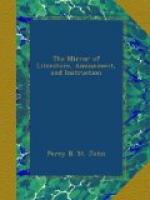Note.—The passage of Lanzi, to which I referred at the commencement, is as follows:—
“The ‘Fall of the Angels,’ still remains in St. Angelo, at Arezzo, in which Lucifer is represented so terrible, that it afterwards haunted the dreams of the artist, and, deranging both his mind and body, hastened his death. Bernardo Daddi was his scholar.”—History of Painting in, Italy, vol. i. p. 65. Roscoe’s Translation.
* * * * *
First in the poetry is the Bechuana Boy, an affecting narrative, by Mr. Pringle, as may be implied from one verse:
He came with open aspect bland,
And modestly before me stood,
Caressing with a kindly hand
That fawn of gentle brood;
Then meekly gazing in my face
Said in the language of his
race,
With smiling look yet pensive tone—
“Stranger—I’m
in the world alone.”
The Irish Mother to her Child, a Song, by Mr. Banim, has great force and feeling, with the date 1828, significantly appended to this stanza:
Alas! my boy, so beautiful! alas! my love,
so brave!
And must your manly Irish limbs still
drag it to the grave?
And thou, my son, yet have a son, foredoomed
a slave to be?
Whose mother, too, must weep o’er
him the tears I weep o’er thee.
Here, too is an exquisite snatch—on Memory:
Fond Memory, like a mockingbird,
Within the widow’d heart is heard,
Repeating every touching tone
Of voices that from earth hath gone.




